Used Machinery - how and where to buy
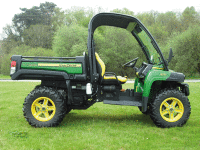
In this article, he discusses the benefits and potential pitfalls of buying used machinery
There is one clear benefit of buying used machinery instead of new; the price. For example, a quick search uncovers a John Deere 2653B available secondhand for £9,995; to buy the same machine new would likely be in the mid £20,000s. Furthermore, the majority of the depreciation, which might be as high as 25% of the investment, will have occurred after the first year of use, meaning that you don't lose as much of your investment when buying used machinery. Savings such as this provide obvious advantages for groundstaff working to a budget, so cannot be simply ignored.
Those experienced in buying used equipment know to look out for certain aspects of the machine to give an indication of its condition. One of the biggest indications could be the number of hours the machine has done. Most people would naturally assume that, when buying a used piece of equipment, it is best to go for the one that has done the fewest hours. Although this can be true, most of the time, it is always important to ask some key questions. For instance, if a mower has recently had new wearing parts like blades, bearings or even tyres replaced, it still might be a better option than one with fewer hours but worn out parts.
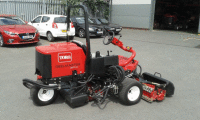
The lower prices aren't the only advantage of buying used machinery; often buying used can be more convenient. It is possible to pick up used machinery from dealers, individuals or other clubs, so it can be readily available. This is particularly useful if you are not lucky enough to be located close to dealers for all the major brands, leaving you with little choice in new machinery.
If you find yourself in the position of needing to replace broken machinery at short notice, then the convenience of buying used can be a big positive. If a piece of machinery has broken down whilst you are trying to get your course in suitable condition for an upcoming event or season, then being without a vital piece of equipment is likely to be a big problem. Going to a dealer and having them deliver a new machine can be time consuming and costly. Also, they might not be able to guarantee it arrives before the season starts. This could have knock on effects if customers decide to use a rival course or companies choose better kept clubs to host their events. Buying used machines could help avoid this problem as they can often be collected or delivered with much shorter notice, although this is only true if the machine is available relatively closely.
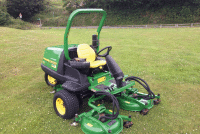
It has to be said that this could be harder to gauge when buying used machinery from a dealer. This is a key question when buying used machinery; are you willing to buy a machine, which might not be the exact spec you want, if you can trust it will do the job and has been well maintained?
An option available to anybody looking to purchase a new piece of machinery is buying from online sites, notably eBay. Buying from such sites does allow for buyers to compare different makes and models fairly easily and can be very convenient. Furthermore, the auction format could mean that it is possible to buy a used machine at less cost than from other private sellers. This is by no means a guarantee, however, and can depend on many variables, for example the amount of people bidding and even the time of day the item finishes.
The unpredictability of auction sites is something that you have to consider when using them. Although they might allow you to get a good deal on used machinery, they do take some commitment in order to find the machine you are looking for at a price you are willing to pay.
Auction sites can be a viable option when looking to buy used or even new machines, but issues you might encounter are the reliability of both the seller and the machine in question.
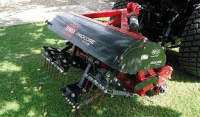
Auction websites like eBay have methods of ensuring that people aren't misrepresenting items they are selling and all sellers are rated on things such as whether products match the description. Therefore, it follows that, when buying from eBay, you should look for sellers with high rating, hopefully meaning you will avoid getting stung!
By taking a bit of care, it is possible to buy a quality used machine for a good deal from auction sites, although buying from a reputable dealer should reduce the risk further.
By purchasing used machinery from a reputable source - for example a dealership, manufacturer or fellow professional - you should avoid many of the potential risks associated with buying online.
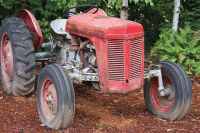
Before you purchase any used equipment, it is important to know whether getting parts are likely to be a problem. If you are purchasing from a dealership, they should be able to give you some idea whether you are going to struggle to get new parts for your machine. Doing some research into availability of parts before committing to a used machine could save you hassle and cost later on.
When buying any equipment, you want to know that it will do a better job than the machine you currently have, otherwise it would be pointless expenditure. Advances in technology have allowed manufacturers to build machines that can cut to more precise levels and leave you with a more even finish. When mowing greens or competitive grounds for professional clubs, this is a matter of great importance. Furthermore, if your machine is going to be used on a high-end golf course or large sports ground, it is important to question whether a dated piece of machinery might affect perceived standards. However, if your mowing needs don't have to be so accurate, or the machine isn't going to be seen by members of the public, it is worth asking yourself whether the expensive outlay for new machinery is totally necessary. Maybe you might be better off saving yourself some money and buying used.
Another concern of many who might otherwise consider buying used machines is warranty. All manufacturers will offer a warranty when buying new machines and this gives turfcare professionals peace of mind that their investment is safer. Buying used machinery might not give such security. Some dealerships may provide a warranty or guarantee on used machines, but it is unlikely that an individual or other club could provide such a guarantee.
Ultimately, what buying used offers is less expensive machines, but they come with a greater risk if you aren't careful.
There are ways to reduce the risk when looking into buying used equipment. Just by asking certain questions, such as how many hours has it done, are the parts in good condition and how well maintained has it been, can increase the chances of buying a good quality used machine.
This does not mean, however, that you are guaranteed to buy a piece of used machinery with no problems. Even the most careful buyer can get stung.

Alex Meacock was a course member on this year's British Guild of Agricultural Journalists' John Deere Training Award for potential agricultural, horticultural and turf journalists. This annual five-day course is primarily aimed at graduating students keen to find full-time or freelance work in the relevant media. Participants receive two days of training in the basics of writing for print and the web, followed by three days of practical work experience. Further details are available in the Awards section of the BGAJ website at www.gaj.org.uk/award/bgaj-john-deere-training-award
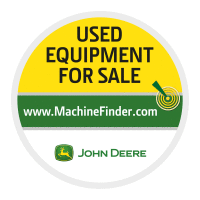
John Deere
In the UK & Ireland, John Deere offer MachineFinder. Whilst predominantly devoted to agricultural equipment, and with the proportion of turf equipment being fairly small, a lot of Gators are sold this way.
MachineFinder provides access to equipment photos, descriptions, details and locations and the tools for you to find and purchase. It also offers a search facility to allow you to source a dealership and/or machine close to home.
http://www.machinefinderuk.co.uk/
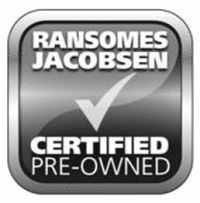
Ransomes Jacobsen offers Certified Pre-Owned (CPO) Equipment; factory-rebuilt, factory-inspected and factory-backed mowing and utility vehicles.
The equipment is completely rebuilt at their Ipswich manufacturing facility using the same OEM parts, factory assemblers and technicians used on their standard equipment lines.
Every piece of machinery is given an exhaustive multi-point inspection to ensure the end suer get the highest-quality machine possible.
All equipment comes with a one-year factory warranty (six months all inclusive, followed by six months parts only.
http://www.ransomestrader.com/
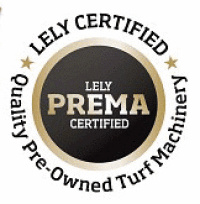
Toro Lely offer their PREMA system. The programme is designed to ensure consistent high quality, and allows customers to buy pre-owned machinery from Lely's acclaimed turfcare network.
Every machine receives a rigorous multipoint inspection by trained technicians covering key mechanical functions including engine and cooling system, hydraulics and electrical system, steering and brakes, chassis, fuel system, transmission and final drives, wheels and tyres, cutting units (cylinder or rotary) and operator's platform and control.
Each machine is backed with a 180 days or 300 hours (whichever occurs first) conditional warranty.
Lely state that, in some cases, they might be able to reconfigure a machine to your own specification.
